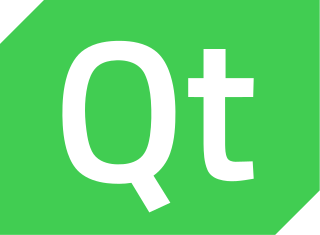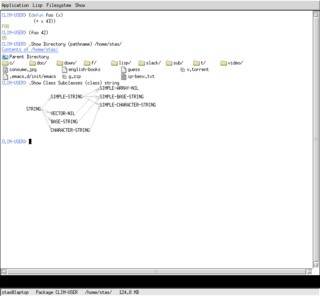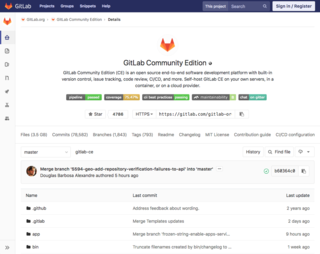
Qt is a free and open-source widget toolkit for creating graphical user interfaces as well as cross-platform applications that run on various software and hardware platforms such as Linux, Windows, macOS, Android or embedded systems with little or no change in the underlying codebase while still being a native application with native capabilities and speed. Qt is currently being developed by The Qt Company, a publicly listed company, and the Qt Project under open-source governance, involving individual developers and organizations working to advance Qt. Qt is available under both commercial licenses and open source GPL 2.0, GPL 3.0, and LGPL 3.0 licenses.

Wine is a free and open-source compatibility layer that aims to allow computer programs developed for Microsoft Windows to run on Unix-like operating systems. Wine also provides a software library, known as Winelib, against which developers can compile Windows applications to help port them to Unix-like systems.

In Unix computing, Blackbox is a free and open-source stacking window manager for the X Window System.
Torque Game Engine, or TGE, is an open-source cross-platform 3D computer game engine, developed by GarageGames and actively maintained under the current versions Torque 3D as well as Torque 2D. It was originally developed by Dynamix for the 2001 first-person shooter Tribes 2. On September 2012, GarageGames released Torque 3D as open-source software under the MIT License.

newLISP is a scripting language which is a dialect of the Lisp family of programming languages. It was designed and developed by Lutz Mueller. newLISP is free and open-source software released under the GNU General Public License, version 3 or later.

StumpWM is a tiling window manager that was created when developer Shawn Betts found ratpoison growing increasingly large and "lispy". Intended as a successor to ratpoison, StumpWM is released under the terms of the GNU General Public License, version 2 (GPLv2).
Hemlock is a free Emacs text editor for most POSIX-compliant Unix systems. It follows the tradition of the Lisp Machine editor ZWEI and the ITS/TOPS-20 implementation of Emacs, but differs from XEmacs or GNU Emacs, the most popular Emacs variants, in that it is written in Common Lisp rather than Emacs Lisp and C—although it borrows features from the later editors. Hemlock was originally written by the CMU Spice project in Spice Lisp for the PERQ computer.
Allegro Common Lisp is a programming language with an integrated development environment (IDE), developed by Franz Inc. It is a dialect of the language Lisp, a commercial software implementation of the language Common Lisp. Allegro CL provides the full American National Standards Institute (ANSI) Common Lisp standard with many extensions, including threads, CLOS streams, CLOS MOP, Unicode, SSL streams, implementations of various Internet protocols, OpenGL interface. The first version of Allegro Common Lisp was finished at the end of 1986, originally called Extended Common Lisp. Allegro CL is available for many operating systems including Microsoft Windows (32/64-bit), and many Unix and Unix-like, 32-bit or 64-bit, including macOS, Linux (32/64-bit), FreeBSD (32-bit), Solaris, UNICOS, and UTS. Internationalization and localization support is based on Unicode. It supports various external text encodings and provides string and character types based on Universal Coded Character Set 2 (UCS-2). Allegro CL can be used with and without its integrated development environment (IDE), which is available for Windows, Linux, and on macOS in version 8.2. The IDE includes development tools including an editor and an interface designer. Allegro CL can be used to deliver applications.

The Common Lisp Interface Manager (CLIM) is a Common Lisp-based programming interface for creating user interfaces—i.e., GUIs. It is a completely object-oriented User Interface Management System, using the Common Lisp Object System and is based on the idea of stream input and output. There are also facilities for output device independence. It is descended from the GUI system Dynamic Windows of Symbolics's Lisp machines Main development was between 1988 and 1993. CLIM 2.0 was released in 1993.
Gambit, also called Gambit-C, is a programming language, a variant of the language family Lisp, and its variants named Scheme. The Gambit implementation consists of a Scheme interpreter, and a compiler which compiles Scheme into the language C, which makes it cross-platform software. It conforms to the standards R4RS, R5RS, and Institute of Electrical and Electronics Engineers (IEEE), and to several Scheme Requests for Implementations (SRFIs). Gambit was released first in 1988, and Gambit-C (Gambit with a C backend) was released first in 1994. They are free and open-source software released under a GNU Lesser General Public License (LGPL) 2.1, and Apache License 2.0.
Chez Scheme is a programming language, a dialect and implementation of the language Scheme which is a type of Lisp. It uses an incremental native-code compiler to produce native binary files for the x86, PowerPC, and SPARC processor architectures. It has supported R6RS standard since version 7.9.1. It is free and open-source software released under an Apache License, version 2.0. It was first released in 1985, by R. Kent Dybvig, originally licensed as proprietary software, and then released as open-source software on GitHub with version 9.4.
Clozure CL (CCL) is a Common Lisp implementation. It implements the full ANSI Common Lisp standard with several extensions. It contains a command line development environment, an experimental integrated development environment (IDE) for Mac OS X using the Hemlock editor, and can also be used with SLIME. Clozure CL is open source and the project is hosted by Clozure Associates.

PicoLisp is a programming language, a dialect of the language Lisp. It runs on operating systems including Linux and others that are Portable Operating System Interface (POSIX) compliant. Its most prominent features are simplicity and minimalism. It is built on one internal data type: a cell. On the language level, a programmer can use three different data types being represented by cells and differentiated by bits at the end of the cell. It is free and open-source software released under an MIT License (X11).

.NET Framework is a software framework developed by Microsoft that runs primarily on Microsoft Windows. It includes a large class library named as Framework Class Library (FCL) and provides language interoperability across several programming languages. Programs written for .NET Framework execute in a software environment named the Common Language Runtime (CLR). The CLR is an application virtual machine that provides services such as security, memory management, and exception handling. As such, computer code written using .NET Framework is called "managed code". FCL and CLR together constitute the .NET Framework.

Mono is a free and open-source project to create an Ecma standard-compliant .NET Framework-compatible software framework, including a C# compiler and a Common Language Runtime. Originally by Ximian, it was later acquired by Novell, and is now being led by Xamarin, a subsidiary of Microsoft and the .NET Foundation. The stated purpose of Mono is not only to be able to run Microsoft .NET applications cross-platform, but also to bring better development tools to Linux developers. Mono can be run on many software systems including Android, most Linux distributions, BSD, macOS, Windows, Solaris, and even some game consoles such as PlayStation 3, Wii, and Xbox 360.

GitLab is a web-based DevOps lifecycle tool that provides a Git-repository manager providing wiki, issue-tracking and CI/CD pipeline features, using an open-source license, developed by GitLab Inc. The software was created by Dmitriy Zaporozhets and Valery Sizov, and is used by several large tech companies including IBM, Sony, Jülich Research Center, NASA, Alibaba, Oracle, Invincea, O’Reilly Media, Leibniz-Rechenzentrum (LRZ), CERN, European XFEL, GNOME Foundation, Boeing, Autodata, and SpaceX.










